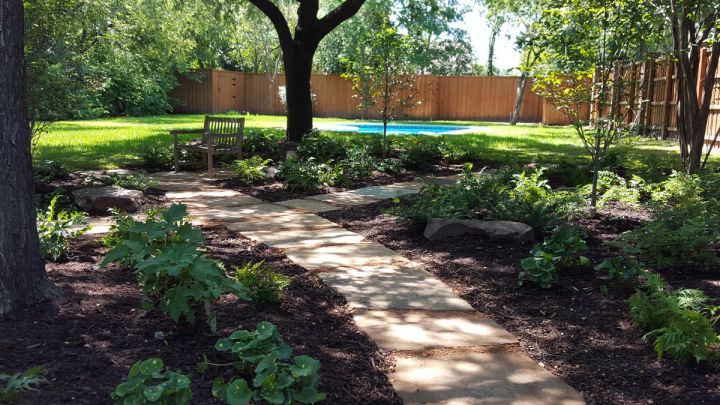Heavy Soil & Rain Got Your Plants Down?
December 22, 2015 | By rli-admin
This year has been a record breaking year in regards to rainfall! Our landscapes have done their best to try and absorb the more than 60” of rain that fell this year...but there’s only so much our heavy clay soils can take. While we can’t deny the positive effects of all the rain on our lakes and aquifers, there have been some downsides for our trees, lawns and garden plants growing in compacted soils.

Our clay soil in the DFW area is naturally very heavy; thus it easily becomes compacted by foot traffic, gravity, and heavy rainfall. When soil is compacted, that means there isn’t much space between the soil particles for air and water to move through. During heavy rain, compacted soil can also become over-saturated. There just isn’t any more space to absorb water. Plant roots then suffocate because they can’t get the oxygen they need: They drown. When all that excess water and runoff leaves your property, it can take with it a lot of the important nutrients in the soil your plants need to thrive. Your plants can then end up with nutrient deficiencies. Not to mention, soil erosion can also be a problem.
Three Negative Effects of Compacted Soil
#1 Suffocation: Did you know roots need to absorb oxygen from the soil in order to live? Compacted soil literally chokes and suffocates plants at the root level. As plants continue to grow in poor soil, they become weak and more attractive to pests and disease.
#2 Nutrient deficiencies: Compacted soil is also a sign that there are a variety of minerals and nutrients missing from the soil. Compacted soils have less bioactivity. Beneficial soil microbes need oxygen too: Without a healthy population of microbes, certain nutrients won’t be available to your plants. Plants suffering from nutrient deficiencies become weak and susceptible to pests and diseases, and may eventually die.
#3 Water retention: When soil is loose and rich with organic matter and microbial growth, water can move through it properly. Healthy soil also retains the right amount of moisture. Compacted soil can keep water from reaching your plants roots (water is not absorbs and simply runs off your property). Water also doesn’t drain properly from compacted soils.
Bring your soil back to life
If you have compacted soil, and the heavy rainfall has made the situation worse, there are some things you (or we) can do to bring your soil back to life.
- Adding expanded to shale to your soil will improve the flow of oxygen and also allow water to drain properly.
- Adding compost and other organic matter to landscape beds and a thin layer on top of your lawn will increase microbial activity in the soil.
- Aerating your lawns once or twice a year will allow more oxygen to reach your lawn’s roots and it will stimulate microbial activity.
- Once your soil health begins to improve, you have the added benefit of attracting earthworms to your landscape. These friends of the garden will continue to improve the soil as they burrow through by aerating the soil and leaving behind their natural fertilizer.
- Don’t over water! Be sure to water with nature, not against it. If it’s been raining and your soil feels moist, you probably don’t need to run your irrigation system.
